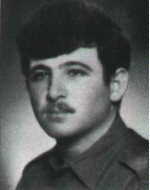Kotzer, Chaim
Their son was the firstborn of Yehiel and Ruth. He was born on August 21, 1950 in Poland. Because of the anti-Semitic atmosphere on the Polish street, the family immigrated to Israel in 1957. Haim began studying at the Tze’elim Elementary School in Be’er Sheva and, having no difficulty in learning the language, soon adapted to the neighborhood children’s society. Like every child he had hobbies, he was collecting stamps and he loved playing football. He used to help his mother with the housework and his younger brother in his studies. When the mother began to work, after her husband died, he became more involved in helping with housework. He was a member of the Hanoar Haoved Vehalomed youth movement, and he traveled on many trips and volunteered for six months in the kibbutzim. He participated in the naval movement and in the course of which he boarded a fishing boat in the Mediterranean. After completing his elementary studies, he was sent to Kibbutz Palmachim because of the family’s difficult financial situation. At first he found it difficult to adapt to the place and often missed home, but after he got used to calling, he even wanted to settle there. He wanted very much to get a driver’s license for a large truck and to work in the market. He passed the driving test on a tractor and got a license. Haim was drafted into the IDF at the end of September 1968 and assigned to the paratroop brigade. Usually he would keep quiet about all the army’s affairs, because he knew that the silence was good for them, but he told us at home about his participation in the sabotage course and that he discovered three mines when he was in Sinai. He was modest and quiet and even a bit shy, but when it came to his assignments, he was strict and serious. (19.10.1970), fell during his service in the Sinai and was brought to rest at the military cemetery in Be’er Sheva, and his words were said by one of the members of Kibbutz Palmahim: “Even before he went to the army Began to fill responsible positions in the agriculture, as an experienced worker. In the path of responsibility and devotion he also went in his military service. We all remember how he struggled to free himself from the limitations of his kind of health. He did not want to lag behind his friends in the military service, and when his struggle was successfully declared, he was very satisfied that he had been assigned to serve in a responsible and dangerous position. It was hard to console his grieving family for the loss that was not repeated. It is only to be expected that in the actions of his comrades and in our actions, we will put a hand in his memory in deeds that his friends will do, and which he wanted to do … “After his fall, a booklet in his memory bearing the name” Chaim “was published.
